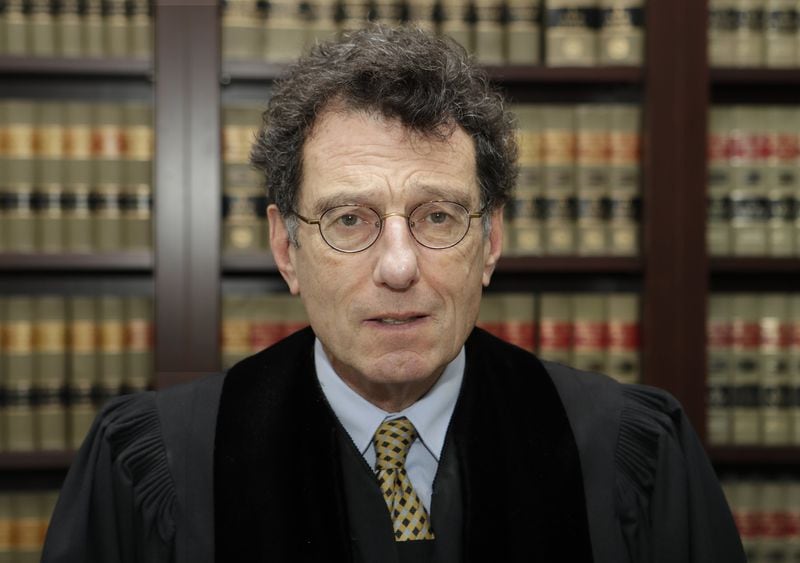Grim-faced Fulton County leaders assembled in their downtown Atlanta auditorium last fall to make a big announcement: the county would become the first in Georgia to sue the opioid industry for damages stemming from the nation’s deadly overdose epidemic.
“This is serious for our community,” Rod Edmond, an experienced family doctor and one of Fulton’s private attorneys, told reporters. “The claim that we have is very simple: These opioid manufacturers and distributors have been flooding our nation with these dangerous drugs for money — for greed.”
Since then, nearly 70 Georgia cities and counties have filed similar lawsuits, seeking to recoup taxpayer expenses for health care and other costs tied to the epidemic, court records show.
» RELATED: As opioid deaths rise, metro Atlanta searches for solutions
» RELATED: Opioid crisis drives up Georgia's overdose deaths to outpace nation
The effort got a boost recently as President Donald Trump asked U.S. Attorney General Jeff Sessions to sue drug makers on behalf of the federal government.
“I would like a lawsuit to be brought against these companies that are really sending opioids at a level that — it shouldn’t be happening. So highly addictive,” Trump told Sessions at a cabinet meeting at the White House Thursday. “People go into a hospital with a broken arm. They come out and they are a drug addict.”
But will the lawsuits do anything to stem the tide of deadly overdoses or are they aimed instead at lining the pockets of lawyers?
From cigarettes to painkillers
There are echoes from 1998, when the tobacco industry settled lawsuits with 46 states for about $206 billion after years of litigation. In fact, some of the state attorneys general who participated in that case are now working as private lawyers representing plaintiffs in the opioid litigation.
Still, there are some big differences between the two cases. Unlike cigarettes, prescription painkillers serve valid medical purposes. Further, the states sued the tobacco industry to recover smoking-related Medicaid costs. In the opioid lawsuits, the plaintiffs are citing a broader variety of expenses, including law enforcement costs. Also, far more parties are involved in today’s legal case. Hundreds of plaintiffs from across the nation have joined the case, now consolidated in a federal court in Cleveland, Ohio. Among them are more than a dozen states. Georgia isn’t among them but state Attorney General Chris Carr joined officials in 30 other states this month in filing court papers opposing the drug makers’ attempts to get Alabama’s lawsuit dismissed. Georgia, meanwhile, is exploring filing its own lawsuit.
It's unknown precisely how much money the plaintiffs could get through any settlement. Officials in Cobb and DeKalb counties, for example, told The Atlanta Journal-Constitution they were still tabulating their costs. Gwinnett County officials declined to comment, citing the pending litigation.
One estimate says the nationwide economic toll topped $1 trillion over the last 17 years. That figure includes lost wages, productivity and tax revenue as well as additional spending on health care, social services, education and public safety, according to the Altarum Institute, a nonprofit health systems research group. The economic toll is predicted to grow by $500 billion through 2020, if the current conditions persist.
Like its neighboring counties, Fulton is still totaling up its costs.
“We haven’t put a dollar amount on it and I’ll tell you why: The crisis has really touched so many different parts of the county,” said Salvatore Badala, an attorney with Napoli Shkolnik, another personal injury law firm that is representing Fulton and many other plaintiffs in the litigation. “It is initially difficult to determine.”
Local governments like Fulton, Badala added, could also use any settlement money to help pay for future costs as people undergo treatment for their addictions.
“This money,” he added, “is really going to help us battle the epidemic.”
‘Corporate greed’
Fulton’s 258-page lawsuit starts out with a bold accusation: “This case is about one thing: Corporate greed. Defendants put their desire for profits above the health and wellbeing of Fulton County consumers at the cost of the plaintiff.”
The suit names more than two dozen defendants, including opioid manufacturers, distributors, doctors, a pharmacy and a clinic. And it accuses them of committing fraud, being negligent and creating a public nuisance. Specifically, Fulton alleges the industry spent hundreds of millions of dollars on a deceptive marketing campaign that trivialized or obscured the dangers of long-term opioid use, including the risk of addiction, overdose and death.
» POLITICALLY GEORGIA: Opioids feed surge in metro Atlanta's fatal overdoses
» THE ECONOMICS: Is America's opioid epidemic killing the economy?
Fulton, according to its legal complaint, has been forced to spend “millions of dollars” each year on health care expenses, law enforcement and other costs. The county cites a specific example in its lawsuit: $49,000 to equip public safety officials with naloxone, an overdose reversal medication.
The county’s lawsuit also underscores the death toll. Nationwide, drug overdoses killed about 72,000 Americans last year, a record number driven by increasing opioid-related deaths, according to estimates recently released by the U.S. Centers for Disease Control and Prevention.
Opioid-related overdoses killed 1,007 people across Georgia last year, including 104 in Fulton, state Department of Public Health figures show. The state's total is up 12 percent from 2016, when it was 897.
Purdue Pharma, which makes OxyContin, is named as one of the defendants in Fulton’s suit. The company — it announced in February that its sales representatives would no longer promote opioids to prescribers — released a statement to the AJC denying the allegations in Fulton’s complaint.
“We share public officials’ concern about the opioid crisis,” Purdue’s statement says. “While our opioid medicines account for less than 2 percent of total prescriptions, we will continue to work collaboratively with the local jurisdictions and the state toward bringing meaningful solutions to address this public health challenge.”
Fulton is also suing Johnson & Johnson and its Janssen Pharmaceuticals subsidiary, which sells Duragesic, or fentanyl, a powerful painkiller. Johnson & Johnson called the allegations in the county’s complaint “baseless and unsubstantiated.”
“Our actions in the marketing and promotion of these medicines were appropriate and responsible,” says the company’s prepared statement. “The labels for our prescription opioid pain medicines provide information about their risks and benefits, and the allegations made against our company are baseless and unsubstantiated. In fact, our medications have some of the lowest rates of abuse among this class of medications.”
» IN-DEPTH: Heroin's trail of death
» RELATED: What the painkillers took
The federal judge overseeing the case has scheduled three of the lawsuits for trial on Sept. 3 of next year, including those filed by Cleveland and Cuyahoga and Summit counties in Ohio. This test trial is meant to help the parties determine how to proceed, whether to settle and how to settle.
During a crowded hearing in January, U.S. District Court Judge Dan Polster indicated he wanted to see swift changes.
“My objective is to do something meaningful to abate this crisis and to do it in 2018,” said Polster, who was nominated to the bench by President Bill Clinton. “And with all of these smart people here and their clients, I’m confident we can do something to dramatically reduce the number of opioids that are being disseminated, manufactured, and distributed.”
Victory not assured
Critics are skeptical about the lawsuits. Lars Noah, a law professor at the University of Florida who focuses on medical technology, called the legal complaints “grandstanding” and “unproductive scapegoating,” predicting they will enrich personal injury lawyers but do nothing to combat the overdose crisis.
“At the end of the day I just can’t imagine that is really going to make much of a difference,” he said. “One of the things that has bugged me about the litigation is it might actually be counterproductive — that it takes some of the heat off state and local officials who need to be cracking down.”
Noah is also skeptical about comparing the case to the national tobacco settlement. He pointed out that opioids are approved by the government and prescribed by doctors, while many of the epidemic’s fatal overdoses are tied to illegal drugs, including heroin laced with fentanyl.
» DEVIL'S DRUG: Meth is back and killing more people then ever
» LEGAL PRESSURES: Fatal heroin overdose tests limits of amnesty law
“Everyone is climbing on board the bandwagon, right? They don’t want to get lost in the shuffle of people looking for a piece of whatever comes of this,” he said. “They have a lot of technical legal obstacles in the way.”
The case could also be tricky to settle, given the many plaintiffs and defendants, said Richard Ausness, a University of Kentucky law professor who teaches and writes about product liability.
“Who is going to pay what?” Ausness said. “The defendants have to reach some kind of agreement. And over on the other end the plaintiffs have to reach some kind of an agreement to apportion the settlement among them. So it is going to be a mess.”
The Athens-based law firm of Blasingame, Burch, Garrard & Ashley has filed lawsuits for 50 Georgia plaintiffs, the most in the state, including Athens-Clarke County. The firm said 22 other parties have signed up with it and will be filing lawsuits. The firm approached some of them about joining the case, while others sought it out, said one of the firm’s lawyers, Drew Hill.
“We have put on some presentations before the counties, sort of educational seminars to kind of bring them up to date as to what is going on,” Hill said. “And then they would decide whether they are interested in proceeding in the litigation.”
The plaintiffs in the case, meanwhile, stress they are seeking far more than a financial settlement: They want to force changes in the way opioids are marketed and distributed. Opioid prescription levels should come down, “or else we are going to be chasing our tail on this problem,” said Fulton Commission Vice Chairman Bob Ellis.
“This is the number one public issue that we have got. The death toll alone is so staggering that it should give everybody pause,” Ellis said. “We need to have a rapid change in the pattern and practice of the industry.”
Polster, the federal judge in the case, has made similar comments.
“Just dramatically reduce the quantity, and make sure that the pills that are manufactured and distributed go to the right people and no one else,” he said during a January hearing, “and that there be an effective system in place to monitor the delivery and distribution, and if there’s a problem, to immediately address it and to make sure that those pills are prescribed only when there’s an appropriate diagnosis, and that we get some amount of money to the government agencies for treatment.”
If Cobb, DeKalb, Fulton and Gwinnett win in court, the law firms representing them would get 25 percent of any settlements, according to contracts obtained through Georgia’s Open Records Act. But the firms get nothing, if they lose, said Edmond, one of the private lawyers representing Fulton.
“We will expend millions of dollars to try to get this case to court,” said Edmond, whose firm is also representing Atlanta and Henry County in the opioid case. “And if we don’t have a successful result, that is something we will just have to walk away from. We will eat that loss.”
Overdose Epidemic:
In recent years, the number of drug overdoses in Georgia has soared, straining the state’s health care, social service and criminal justice systems. And that doesn’t begin to measure the toll inflicted on family, friends and loved ones of those ravaged by addiction. In a series of stories, The Atlanta Journal-Constitution is examining the impact of this alarming trend, what is being done to combat it and the challenge that lies ahead. In July, The AJC reported on the comeback of methamphetamine, which has steadily claimed more lives since 2010. Today’s article examines how Atlanta-area governments are battling the opioid industry in federal court. A future story will explore how one local man survived his opioid addiction and lived to tell his inspiring story about it.
About the Author








